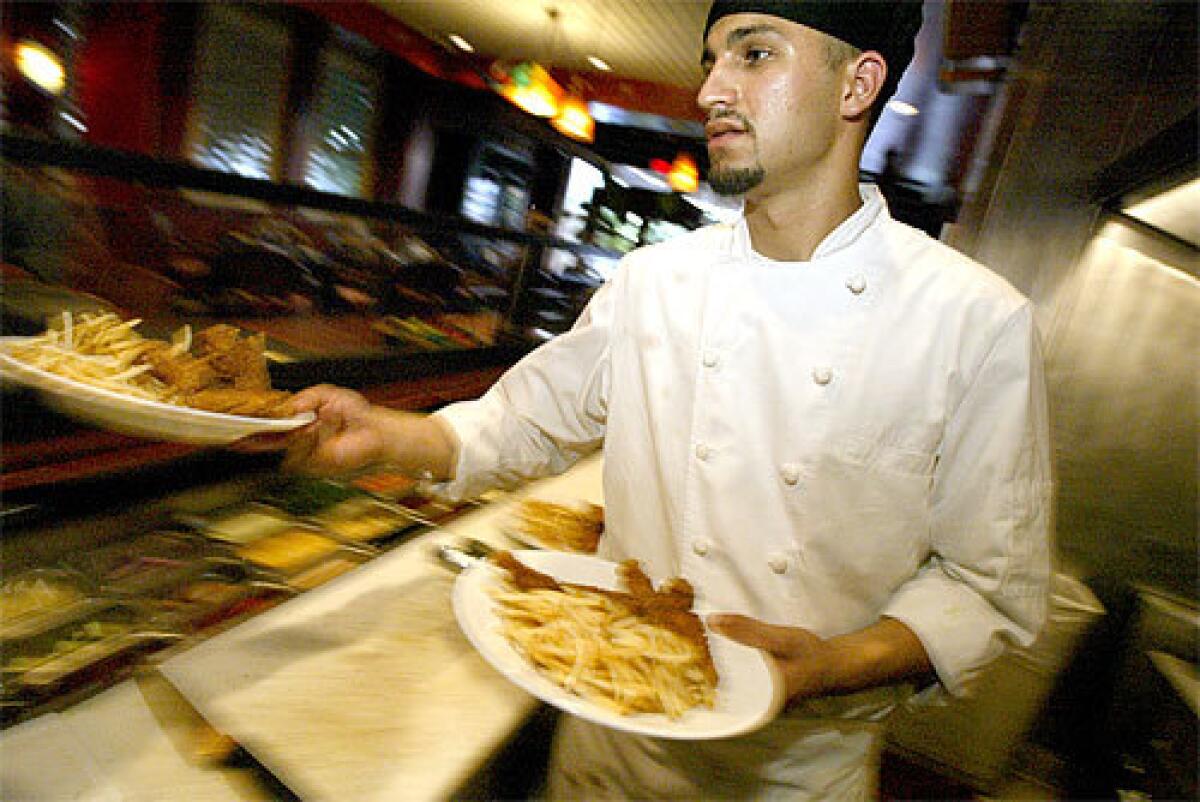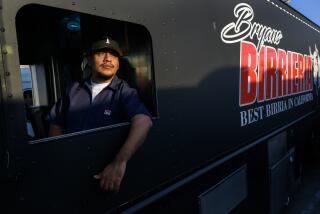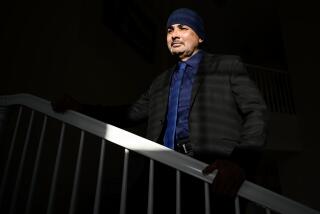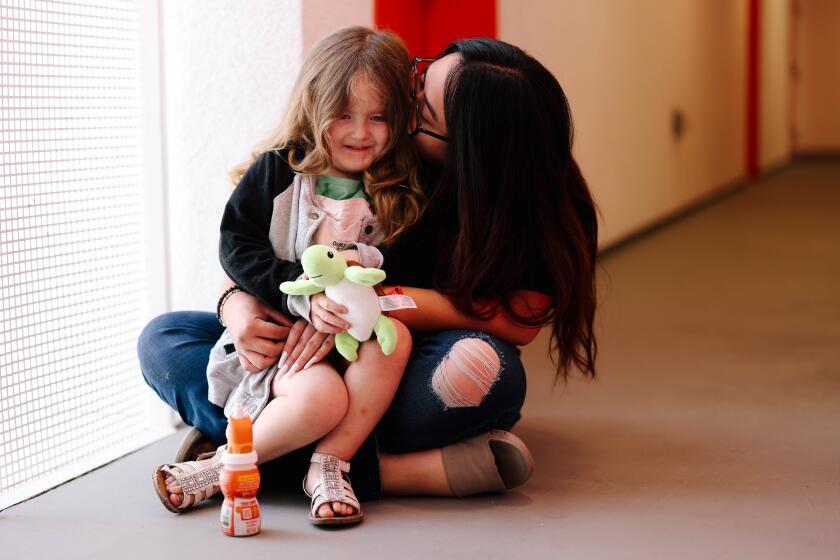Cooking Gave Him a Range of Opportunities

Rigo Salas stands in the open kitchen at the Beverly Hills restaurant where he works, a master of multi-tasking: sliding a steak onto a plate for a diner, giving direction to a co-worker, taking a special order from a waiter.
And talking about the life that was nearly his.
“Since first grade,” he said, “I looked forward to being in a gang.”
But the dozen or so brown scars that cover his hands, as defining as gang tattoos, were left by hot pans and chef’s knives, and they mark him instead as a cook.
Just a few years ago, Salas had no plans to be a chef. In fact, he had no plans at all. Unless you count his longing to be a gang hotshot like his uncle, the big man around their Wilmington neighborhood, the man everyone feared.
Salas sold pot, sold crack, got high, got Fs in school, bought a gun, ran with the Ghost Town Bloods, got arrested, lost a loved one to violence. He went to six middle and high schools, came and went as he pleased through his bedroom window.
“I was really a big burden to my family,” he said.
“I could see the route Rigo was on,” said an aunt, Nena Molinari, whose husband was Salas’ idol. “He had a lot of anger, that comes with it. He was a mean person foul language, moving from relative to relative. No one could control him.”
But he found he could cook, and he liked being able to create something — even, at first, a cake from a mix. And that saved him. That and the fact that his adored uncle started going to church.
“I wanted to mimic him exactly,” said Salas, who is just shy of 20. “He was my example in the past and my example now. Someone who was strong.”
Rigoverto Salas told his story in the dining room and the kitchen of Lot 1224, the restaurant at the Loews Beverly Hills Hotel, where he works.
“Look at this,” Salas said one night, pulling a bowl of rose-colored tuna from the refrigerator. “It’s flown in every day from Honolulu. It’s beautiful.”
He has learned to appreciate fine food and good ingredients. He won a scholarship from a nonprofit program and went to culinary school in Pennsylvania. These days he also goes to church, is engaged to be married and thinks about teaching cooking in high school.
And he tries out his ideas in the restaurant. His boss and mentor, hotel executive chef Kelly Wangard, said she often finds him working on new dishes.
Wearing clogs, checked pants, a white chef’s jacket and a black pillbox cap, he ran the kitchen one recent night, working calmly at an open area in the dining room, talking with the waiters and another cook, moving from salads to grilled steak with Gorgonzola sauce.
Salas is tall and handsome, with a broad smile. His dark hair is short. He emerged from the chaos of his childhood with a remarkably calm demeanor. He likes being able to see the diners, to watch their reactions to his food, to chat with them.
The seeds of his salvation were sown early. As a boy, he baked cakes, from mixes, in private at home because it was “not a macho thing to do.”
But he loved it. And he branched out to casseroles.
Meanwhile, he was itching to grow up enough to follow his uncle into the Ghost Town Bloods.
His uncle was something, Salas said. People like him were “living wealthy, and that’s what I wanted” — a car, going to Disneyland, clothes.
Salas said he was worried even to reveal his uncle’s name in an interview, but considered him a father figure who did not want him to adopt a street life.
“But he kind of knew that my mind was already made up,” Salas said.
By 14, he was selling drugs at school and on the street, “and it came to the point where I had to carry a gun.”
It was, not surprisingly, a life Salas found he could not sustain.
Just two days after he was caught at school with “a substantial” amount of marijuana, he sold drugs to an “undercover young lady,” he said.
He was facing a felony charge, terrified of prison, and he was just 15.
“Everything started collapsing. It was truly just me alone,” he said. Salas pleaded guilty and was sentenced to probation, counseling and community service, he said.
Meanwhile, life had been tough on his uncle, who had gotten shot in the face, which required his jaw to be wired. He started going to church.
Salas again followed, and in fits and starts eventually became part of a nondenominational Christian church. Religion and food, he said, rescued him.
He landed at Banning High, one of 26 schools in the Los Angeles Unified School District that get money from C-CAP, the Careers Through Culinary Arts Program. Founded in New York in 1990, the program gives student scholarships and trains high school teachers. It is intended to give students who might otherwise fail or drop out a chance at a culinary profession.
“What they have to overcome — they work in a place they never even thought they could walk into, or never even imagine,” said Mary McAlpine, an instructor in the culinary arts program at Banning. She has 180 students during the school year, about a quarter of them planning a culinary career.
Chefs work nights, weekends, sacrifice holidays, she said, but the work is appealing: “To actually know you can create something — it’s not just cooking.”
Salas, she said, “had such a passion” for cooking.
His cooking classes led to a competition, and Salas won a C-CAP scholarship to the Restaurant School at Walnut Hill College in Philadelphia, where he earned an associate’s degree in February.
His training included a week in France, where he tasted and toured and was tested. He ate five-course meals, “when I was used to eating at taco trucks.”
Unlike some of his classmates, he said, he had exhausted his desire to party. He spent a lot of time alone, but never saw the school as his ticket out of Wilmington.
“I was homesick from the day I got there until the day I left,” he said. In December, he came home to his mother, his three siblings and the rest of his family, including his uncle.
But in March, the uncle was ambushed, shot dead in his car; no one has been charged, Salas said.
His uncle is often on Salas’ mind as he makes his plans: for a September wedding to a woman studying to be a preschool teacher and for the possibility of becoming a father himself and passing on the lessons he struggled so hard to learn.
More to Read
Start your day right
Sign up for Essential California for news, features and recommendations from the L.A. Times and beyond in your inbox six days a week.
You may occasionally receive promotional content from the Los Angeles Times.







